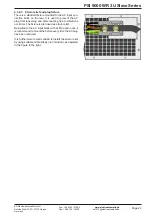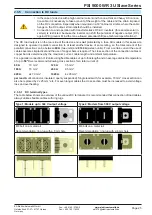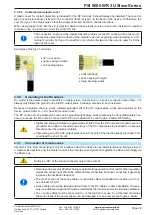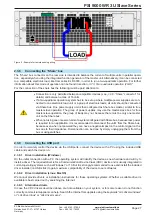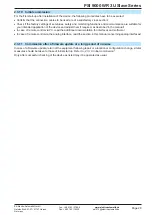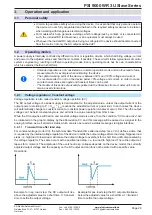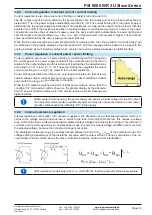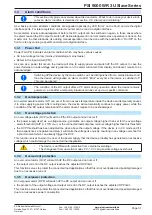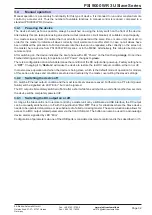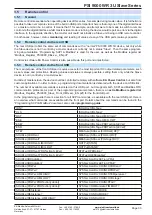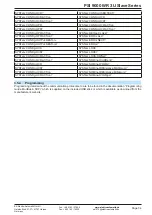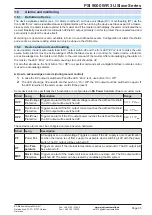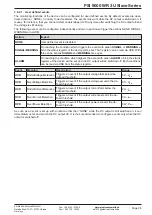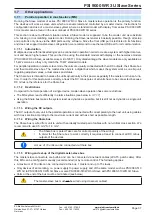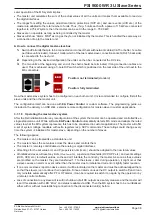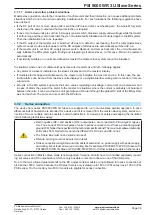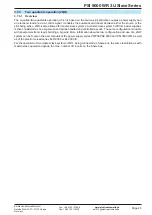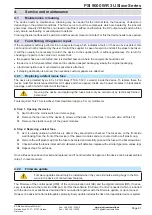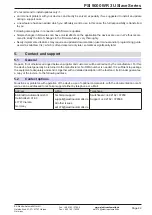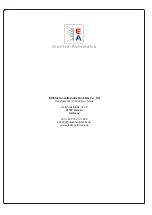
Page 38
EA Elektro-Automatik GmbH
Helmholtzstr. 31-37 • 41747 Viersen
Germany
Fon: +49 2162 / 3785-0
Fax: +49 2162 / 16230
www.elektroautomatik.de
PSI 9000 WR 3U Slave Series
Later operation of the MS system implies:
•
The master unit calculates the sum of the actual values of all the units and makes them available to read via
the digital interfaces
•
The ranges for setting the values, adjustment limits, protections (OVP etc.) and user events (UVD etc.) of the
master are adapted to the total number of units. Thus, if e.g. 5 units each with a power of 15 kW are connected
together to a 75 kW system, then the master can be set in the range 0...75.00 kW.
•
Slaves are no operable as long as being controlled by the master
•
Slaves will show “Alarm: MSP” as long as they’re not initialised by the master. This is handled the same way as
a connection drop to the master unit.
►
How to connect the digital master-slave bus
1.
Switch off all units that are to be connected and connect them with network cables (CAT3 or better, 1x cable
per Slave unit included). It doesn’t matter which of the two master-slave connection sockets (RJ45, backside)
is connected to the next unit.
2.
Depending on the desired configuration the units can then be connected at the DC side.
3.
The two units at the beginning and end of the chain should be terminated, if long connection cables are
used. This is achieved using a 3-pole DIP switch which is positioned on the rear side of the unit next to the
MS connectors.
►
Position: not terminated
(standard)
Position: fully terminated
Now the master-slave system has to be configured on each other unit. It is recommended to configure first all the
slave units and then the master unit.
The configuration itself can be done with
EA Power Control
or custom software. The programming guide, as
included in the delivery on USB stick, explains remote configuration for master-slave in custom applications.
3.7.1.6 Operating the master-slave system
After the first initialisation after any reconfiguration of the system the master can be operated and controlled like a
single stand-alone unit. While software
EA Power Control
automatically detects MS mode and adapts the rated
values to what the MS system represents, this has to be considered in custom applications. The master will offer
a set of system ratings, readable with extra registers resp. SCPI commands. These ratings could change every
time the system is initialised for master-slave, depending on the number of slaves.
The following applies:
•
The master can be treated like a standalone unit
•
The master shares the set values across the slaves and controls them
•
The master is remotely controllable via the analog or digital interfaces
•
All settings for the set values U,I and P (supervision, limits etc.) should be adapted to the new total values
•
All initialised slaves will reset any limits (U
Min
, I
Max
etc.), supervision thresholds (OVP, OPP etc.) and event settings
(UCD, OVD etc.) to default values, so these don’t interfere the control by the master. As soon as these values
are modified on the master, they are transferred 1:1 to the slaves. Later, during operation, it might occur that
a slave causes an alarm or event rather than the master, due to imbalanced current or slightly faster reaction.
•
If one or more slaves report an device alarm, it will be indicated on the master and must be acknowledged there
so that the slave(s) can continue their operation. Since an alarm causes the DC output to switch off and it can
only reinstate automatically after PF or OT alarms, it can be required to switch it on again by the operator or by
a remote control software.
•
Loss of connection to any slave will result in shutdown of all DC outputs as a safety measure and the master will
report this situation with LED “Error” and status readable via USB. Then the MS system has to be re-initialised,
either with or without re-establishing connection to the disconnected unit(s) before.

